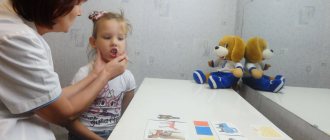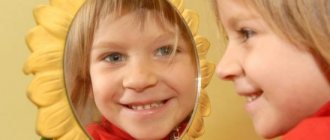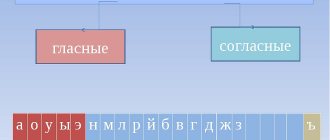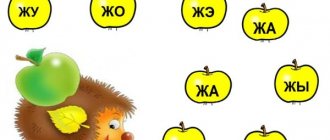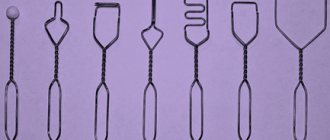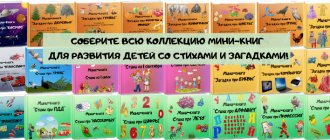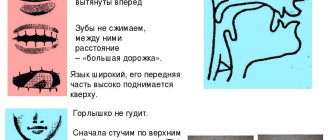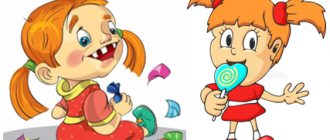Articulation of sounds
Articulation is the work of the speech organs during sound pronunciation. The correct position of the lips, tongue, and the strength of the air stream play an important role in the formation of beautiful, clear speech. If the articulation of sounds [S - Ш] is impaired, the speech therapist teaches the child to pronounce them correctly, and only then automates and achieves differentiation.
Sound C
You need to learn to pronounce this phoneme hard [S] and softly [S'].
The position of the speech organs will be slightly different:
- Stretch your lips and press them lightly against your teeth.
- Do not unclench your teeth too much, maximum 1 mm.
- Keep your tongue wide and press the tip against your lower incisors.
- Bend the back of your tongue so that there is a groove in the middle.
- Press the sides against the molars so that the air does not pass past the back of the tongue.
- Exhale cold air, direct it down the groove through the teeth.
- To articulate the soft [C'], stretch your lips a little more, arch the back of your tongue and tense its muscles. Exhale the air sharply, briefly, with the tip lightly on the inside of the lower teeth.
Sound Sh
Pay attention to the position of the lips, tongue, strength and direction of the air stream:
- Round your lips and pull them forward.
- Open your mouth so that there is no more than 1 mm between your teeth.
- Hold your tongue wide with a spatula. Lift it towards the upper alveoli. You can't touch your teeth.
- Exhale slowly, the stream is warm and plentiful.
3 WORD SENTENCES
Continuous steppe expanses. Resinous pine cones. A large cliff.
If you hurry, you will make people laugh. Throw this brooch away. Shura dried crackers. All ears and ears. The sun is in the window. Hairpin. Sasha has a car. Sasha is six years old. Sasha has sandals.
The sun is shining brightly. The girl has freckles. Watchman in the huts. A smart and fluffy little mouse. Sasha dries the dryers. If you hurry, you will make people laugh. They sewed a fur coat for Shura. Sonya feeds the cat.
The fox caught the mouse. The book has a dust jacket. Sasha has a car. Sasha has sandals.
Sound differentiation
Before performing exercises on differentiating sounds [С – Ш], perform a complex of articulatory gymnastics with your child on whistling and hissing sounds in order to prepare the articulatory apparatus for the lesson.
In straight syllables
Training in the correct pronunciation of sounds [S] - [SH] is carried out simultaneously. Children with similar speech disorders confuse these phonemes in free utterances, so it is important to make the correction automatic.
To differentiate the sounds [С] – [Ш] in straight syllables:
SA – SHA SHA – SA SO – SHO SHO – SO SU – SHU SHU – SU SY – SHI SHI – SY SE – SHE SHE – SE
Straight syllables can be repeated after a speech therapist or read from a sheet or book. If you work with a group, print out cards for the children and let them say it in chorus. Be sure to monitor the accuracy of the task. If a child has difficulty articulating the soft [S'], prepare the exercises individually, including a large number of combinations with vowels [I], [E].
In reverse syllables
| A | ABOUT | U | AND | Y | E | E | |
| WITH | AC | OS | US | IP | YS | EU | ES |
| Sh | AS | OSH | USH | IS | YSH | ESH | ES |
Group letter combinations in pairs in any order. For individual lessons with a preschooler, rely on the characteristics of his speech, difficulties with articulation and discrimination.
ASH-AS USH-US ISH-IS ESH-ES YSH-YS OSH-OS ESH-ES AS-ASH US-USH IS-ISH EC-ESH YS-YSH OS-OSH ES-ESH USH-US ISH-US ASH- US ESH-US YSH-US OSH-US ESH-US
For older preschoolers, you can use combinations with all iotated vowels:
| E | Yo | YU | I | |
| WITH | EU | YOS | YUS | I'M WITH |
| Sh | ESH | YOSH | YUSH | JAS |
ESH - ES EU - ESH YOSH - YOS YOS - YOSH YUSH - YUS YUS - YUSH YASH - YAS YAS - YASH
YAS-YASH YAS-YUSH YAS-ESH YAS-YOSH YASH-YAS YASH-YUS YASH-ES YASH-YOSH OSH-OS USH-US ISH-IS YASH-AS YUSH-US
Important! During the first lessons with syllables, do not rush the children. Bring reading and pronunciation to automaticity in 3-4 lessons. At lesson 5-6, the speed will increase independently without additional pushing by 2-3 times.
In intervocalic syllables
These are tasks for reading syllables with two vowels and the required consonant between them. First, compose examples with the phonemes A, O, U, E, I, Y, then with the iotized E, Yo, Yu, Ya. As a result, you will get more than 100 variants of cards.
ASA-ASHA OSA-OSHA USA-USHA ESA-ESHA ISA-ISHA YSA-YSHA ASA-ESHA YSA-YOSHA YUSA-YUSHA YSA-YASHA USU-USHU ASA-ASHA OSO-OSHO ESE-ESHE ISI-ISHI YSY-YSHI ESE- YESHE YOSHO-YOSHO YUSHU-YUSHU YASYA-YASHA YSHI-YSI ASHI-ASHI OSHI-OSHI ESI-ESHI YSI-ISHI ISI-ISHI YOSHI-YOSHI YESHI-ESHI YUSHI-YUSHI YASHI-YASHI
In closed syllables
Such tasks help the child differentiate the phonemes [s], [w] simultaneously at the end and beginning of syllables and words. This is difficult, it requires increased attention from children, so it is used from the second or third correctional lesson. Demonstrate speech therapy material on separate cards with one syllable or let's read them all at once. There are few letter combinations in closed syllables:
| A | ABOUT | U | AND | Y | E | E | Yo | YU | I |
| CAC | SOS | SUS | SIS | SYS | SES | CJEU | SOS | SUS | strategic nuclear forces |
| SAS | secondary school | SUSH | SIS | SYSH | SES | SES | SES | SUSH | SYASH |
| SHASH | SHOSH | SHUSH | SHISH | SHES | SHESH | ||||
| Shas | SCO | SHUS | SHI[s]S | SES | SHES |
For group work, it is convenient to use presentations with syllables, words, and sentences. You can read the speech therapy material in chorus or ask individually, while the others speak to themselves at this time.
In words
At the beginning of the word:
Offer to come up with words for a certain syllable.
SHA – ball, hat, scarf. SA - sled, self, barn. SU – bag, chest, sealing wax. SHI – awl, cipher, latitude.
Letter at the beginning of a word:
Sasha, Catfish, Cheese, Lilac, Sofa, Sonya, Sugar. Scar, Shorts, Helmet, Spike, Chiffon.
In the middle of a word:
Sperm Shalot, Kite, MaShem, Wallet. Sand, I'm carrying, cowards, I'm making noise.
At the end of the word:
MorS, vorS, tors US. KamySh, lilies of the valley, goulash, bereSh.
In one word:
Dry, listen, coward, SUCCESS, freckles.
Children must pronounce words and sounds clearly. First at a slow pace, then at a fast pace. Clarify the meanings of words unknown to preschoolers in advance.
In phrases
Differentiation of sounds “S” - “Ш” in phrases:
Strong bumblebee Obedient baby Fox hat Fragrant lily of the valley Last year's snow The soldier has an overcoat Funny whisper Whisper of leaves Drying crackers Tiny catfish Cheerful shepherdess Good joke Beautiful waves Noisy step Foamy shampoo Wide sundress
Pronounce syllables and words in pairs:
Prepare cards with words. It is better to arrange the material in columns:
SHO - SO SHA - SA bag-hair salad - hut piece-fluff hat - cod sock-rustle stir - write
SHU - SU SHI - SI fur coat-drying to sew - sieve plowing - carrying lilac - latitude weighing-drying decided - asked
OSH - OS ASH - AS went - the hut grew - the mattress was a penny - the porridge grew - the helmet
Pronounce words with sounds [C] and [Ш]
Print the words in text or columns. For group lessons in the middle group, you can display the material on a slide and accompany the words with pictures:
Fur coat, bag, rustle, herring, rustle, varieties, Sashenka, drying, successfully, hurry, fragrant, funny, make me laugh, dry land, son, highway, six, sunshine, glass, rhyme, chuckle, cat, from above.
After reading, ask the children to make sentences using a group of words. For example, from 3 words: sun, mouse, six:
- Six little mice are lying in the sun.
- At six in the morning the little mice woke up to bask in the summer sun.
In sentences
Children need to read, repeat the sentences and conjugate them orally:
- I hear the noise - I listen to the noise - I listened to the noise - we listen to the noise - they listen to the noise...
- I washed the bowl of porridge - we washed the bowl of porridge - they washed the bowl of porridge...
- I dry the fur coat - we dry the fur coat - you dry the fur coat - you dry the fur coat - he dries the fur coat - they dry the fur coat...
As speech material for reading and speaking without changes in tenses and persons, use sentences of 3-5 words:
- The basket was hung on the window.
- Sasha has a fur coat and a hat.
- Six puppies are hungry.
- The highway in front of Sonya is wide.
- The cockerel sat on the pole.
- Porridge with jelly for breakfast.
- Shura was sewing a fur coat.
- Through the green glass we look at the sun.
- The hut was built on the sand by nimble kids.
- In the swamp wilderness the reeds rustle.
Tongue Twisters
For preschoolers 4-5 years old, simple phrases of 3-4 words are suitable:
- If you hurry, you will make people laugh.
- Cones grow on a pine tree.
- Sasha took off her hat.
- The mice rustle in the hut.
Achieve clear, quick pronunciation of all sounds. Tongue twisters can be used as a warm-up at the beginning and end of a lesson on differentiating sounds [s] and [sh], and given at home for learning in groups.
For preschoolers aged 5 years and older, choose more complex tongue twisters of 5-10 words:
- They gave Masha porridge with yogurt, but Masha only ate the yogurt.
- At the edge of the forest, in a hut, there lived old women who were funny. Each of them has a cat.
- Vanya has a shirt, there are six pockets for shirts.
- Sanya has pine cones, dried fruits, crackers and checkers in his pocket.
Proverbs and sayings
Before memorizing proverbs and sayings, discuss their meaning with your children and explain unfamiliar words:
Shear the wool, but don't tear the skin. Don’t hide the sewing in the bag, you still can’t hide it. A joke is a joke, but get the job done. She sews, but the threads all come out. Don't compete with the rich with your wallet, don't fight with the strong with your fist. You can even take a tuft of fur from a mad dog. It fell from the cart and is almost completely lost. The old women listened to the mice rustling and the cuckoos cuckooing.
Lyrics
The printed texts are read by the teacher, the children listen and retell.
Rose hip
Masha had a kindergarten. A beautiful rose hip grew there. On one side there are red flowers. On the other hand, pink. Bumblebees rustled in its leaves, bees collected delicious nectar. Masha watered the rose hips every morning. But I was afraid to touch the leaves, branches and flowers, they were too prickly. The rosehip began to grow and expand. It spreads widely over the garden, with no room for other flowers and bushes. Masha scolded the rosehip, shoot, she said, go to her place.
If children find it difficult to retell based on what they heard, ask questions about the content of the story. For example, where did the rosehip grow? Rose hips grew in the garden. Who watered the rose hips and when? Masha watered the rose hips every morning.
Nimble mouse and dog Sima
Once upon a time there were two friends: a mouse and a puppy Simka. Both were cheerful and lively. They loved to play with reeds, balls and pine cones. Once my friends found big reeds. They fluffed them up, the fluffs flew around funny like snow. Mouse’s mother asks: “Who littered the reeds?” You? The mouse and the dog Sima answer: “Don’t worry, Mom Mouse.” We are not afraid of cleaning. Let's take away the fluff and quickly collect the reeds ourselves. These are the kind of helpers that grow!
On a note! An additional task for the text could be: drawing in a notebook according to the plot of the story, coming up with a continuation of the story.
Poems
Study with your children in a group or give them as homework:
*** Fluffy little ear, Fluffy lump Jump and hop along the edge.
*** Mice eat grains and move their mustaches.
*** Oh, what porridge Masha cooked for you! There is no more satisfying porridge than our Masha’s.
*** Nice fields, along the edge of the forest, past the noisy poplars, cheerful old women walked to visit their granddaughter.
*** Cars rush along the highway, their tires rustling loudly. The children are watching from the cabin, Eh, expensive, good!
*** Sleeping sweetly in the den….(bear) There is a big….(bump) on the pine tree. Ours will wake up...(bear) He will become loud...(roar).
*** We sewed a shirt for the bear, and we’ll sew some pants as soon as possible. Where should we sew a pocket to put a cracker?
*** Porridge was cooked on the stove, Where is our big bowl. We'll eat the porridge and kiss grandma.
3 WORD SENTENCES
Continuous steppe expanses. Resinous pine cones. A large cliff.
If you hurry, you will make people laugh. Throw this brooch away. Shura dried crackers. All ears and ears. The sun is in the window. Hairpin. Sasha has a car. Sasha is six years old. Sasha has sandals.
The sun is shining brightly. The girl has freckles. Watchman in the huts. A smart and fluffy little mouse.
Sasha dries the dryers. If you hurry, you will make people laugh. They sewed a fur coat for Shura. Sonya feeds the cat.
The fox caught the mouse. The book has a dust jacket. Sasha has a car. Sasha has sandals. If you hurry, you will make people laugh
4 WORD SENTENCES
Dried pears and plums. We've been telling jokes for six days. The bear eats from a bowl.
Sanya is a miner, Misha is a driver. The driver stepped off the step. The mice will wash the bowl for the bear.
Sasha hit a bump with his hat. Six kittens are hungry. Sasha has six pieces of glass.
Sasha is walking along the highway. The fox-sister is a master at composing. The pine trees rustle in the wind. Sasha with a hat
Knocked a bump. Sasha walked with the old woman. Pasha is a coward, he’s scared. Grandfather is sleeping on the sofa. There is a red pencil in the pencil case. Sasha walked with the old woman. Pasha is a coward, he’s scared
Six kittens are hungry. The fishermen in the hut woke up. Sasha has six pieces of glass
